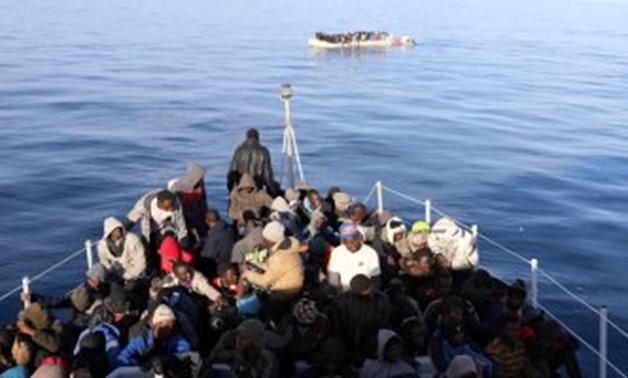
Unregistered migrations in a boat - file
CAIRO - 29 November 2022: Egypt has amended some provisions of the Law on Combating Illegal Immigration, in line with the national strategy to combat unregsitered immigration by imposing penalty on violators.
The Law on Combating Illegal Immigration and Smuggling of Migrants promulgated by Law No. 82 of 2016, is amended in line with the provisions of the Constitution and relevant international agreements.
The ammendments also go the lines with the most prominent objectives of the national strategy to combat illegal immigration, which aims to protect groups most at risk of exploitation by smugglers, who are youth, children and their families, and illegal immigrants to Egypt, as well as deterring and punishing immigration brokers and dealers through strict procedures and penalties.
According to the new legislation, whoever commits the crime of smuggling migrants, attempts to do it, or mediates in it, shall be punished with temporary hard labor and a fine of not less than two hundred thousand pounds and not more than five hundred thousand pounds, or a fine equal to the value of the benefit he received.
The penalty shall be temporary hard labor for a period of not less than five years and a fine of not less than five hundred thousand pounds and not more than one million pounds, or a fine equal to the value of the benefit accrued to him, whichever is greater, if the smuggled migrant is a woman, a child, an incapacitated person, or a person with a disability.
The state is taking parallel steps to reduce unregistered immigration and human trafficking, within the framework of the National Strategy to Combat Illegal Immigration (2016-2026), which aims to protect groups most at risk of exploitation by smugglers, especially youth, children and their families, which works to direct campaigns to villages, in order to educate families and families, and coordinate with civil organizations to reach the villages that most export migratio, in addition to training young people and qualifying them for the labor market.
The state also provides social protection programs for victims of human trafficking, starting with providing a place for the victims to reside upon arrival, where shelters have been established in coordination with the concerned authorities, including Social solidarity and national councils, in order to reach legal representation during the consideration of the case, as well as providing job opportunities, psychological rehabilitation programs, and integration into society.
Comments
Leave a Comment